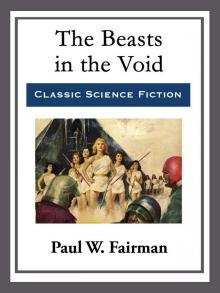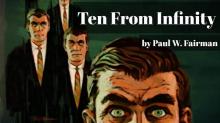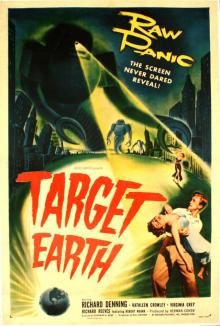- Home
- Paul W. Fairman
Deadly City
Deadly City Read online
Produced by Greg Weeks, Mary Meehan and the OnlineDistributed Proofreading Team at https://www.pgdp.net
DEADLY CITY
By Ivar Jorgenson
Illustrated by Ed Emsh
[Transcriber Note: This etext was produced from IF Worlds of ScienceFiction March 1953. Extensive research did not uncover any evidence thatthe U.S. copyright on this publication was renewed.]
[Sidenote: _You're all alone in a deserted city. You walk down an emptystreet, yearning for the sight of one living face--one moving figure.Then you see a man on a corner and you know your terror has onlybegun._]
He awoke slowly, like a man plodding knee-deep through the thick stuffof nightmares. There was no definite line between the dream-state andwakefulness. Only a dawning knowledge that he was finally conscious andwould have to do something about it.
He opened his eyes, but this made no difference. The blackness remained.The pain in his head brightened and he reached up and found the big lumpthey'd evidently put on his head for good measure--a margin of safety.
They must have been prudent people, because the bang on the head hadhardly been necessary. The spiked drink which they had given him wouldhave felled an ox. He remembered going down into the darkness afterdrinking it, and of knowing what it was. He remembered the helplessfeeling.
It did not worry him now. He was a philosophical person, and the fact hewas still alive cancelled out the drink and its result. He thought, withsavor, of the chestnut-haired girl who had watched him take the drink.She had worn a very low bodice, and that was where his eyes had been atthe last moment--on the beautiful, tanned breasts--until they'd waveredand puddled into a blur and then into nothing.
The chestnut-haired girl had been nice, but now she was gone and therewere more pressing problems.
He sat up, his hands behind him at the ends of stiff arms clawing intolong-undisturbed dust and filth. His movement stirred the dust and itrose into his nostrils.
He straightened and banged his head against a low ceiling. The pain madehim sick for a minute and he sat down to regain his senses. He cursedthe ceiling, as a matter of course, in an agonized whisper.
Ready to move again, he got onto his hands and knees and crawledcautiously forward, exploring as he went. His hand pushed throughcobwebs and found a rough, cement wall. He went around and around. Itwas all cement--all solid.
Hell! They hadn't sealed him up in this place! There had been a way inso there had to be a way out. He went around again.
Then he tried the ceiling and found the opening--a wooden trap coveringa four-by-four hole--covering it snugly. He pushed the trap away anddaylight streamed in. He raised himself up until he was eye-level with adiscarded shaving cream jar lying on the bricks of an alley. He couldread the trade mark on the jar, and the slogan: "For the MeticulousMan".
He pulled himself up into the alley. As a result of an orderlychildhood, he replaced the wooden trap and kicked the shaving cream jaragainst a garbage can. He rubbed his chin and looked up and down thealley.
It was high noon. An uncovered sun blazed down to tell him this.
And there was no one in sight.
* * * * *
He started walking toward the nearer mouth of the alley. He had been inthat hole a long time, he decided. This conviction came from his hungerand the heavy growth of beard he'd sprouted. Twenty-four hours--maybelonger. That mickey must have been a lulu.
He walked out into the cross street. It was empty. No people--no carsparked at the curbs--only a cat washing its dirty face on a tenementstoop across the street. He looked up at the tenement windows. Theystared back. There was an empty, deserted look about them.
The cat flowed down the front steps of the tenement and away toward therear and he was truly alone. He rubbed his harsh chin. Must be Sunday,he thought. Then he knew it could not be Sunday. He'd gone into thetavern on a Tuesday night. That would make it five days. Too long.
He had been walking and now he was at an intersection where he couldlook up and down a new street. There were no cars--no people. Not even acat.
A sign overhanging the sidewalk said: Restaurant. He went in under thesign and tried the door. It was locked. There were no lights inside. Heturned away--grinning to reassure himself. Everything was all right.Just some kind of a holiday. In a big city like Chicago the people goaway on hot summer holidays. They go to the beaches and the parks andsometimes you can't see a living soul on the streets. And of course youcan't find any cars because the people use them to drive to the beachesand the parks and out into the country. He breathed a little easier andstarted walking again.
Sure--that was it. Now what the hell holiday was it? He tried toremember. He couldn't think of what holiday it could be. Maybe they'ddreamed up a new one. He grinned at that, but the grin was a littletight and he had to force it. He forced it carefully until his teethshowed white.
Pretty soon he would come to a section where everybody hadn't gone tothe beaches and the parks and a restaurant would be open and he'd get agood meal.
A meal? He fumbled toward his pockets. He dug into them and found ahandkerchief and a button from his cuff. He remembered that the buttonhad hung loose so he'd pulled it off to keep from losing it. He hadn'tlost the button, but everything else was gone. He scowled. The leastthey could have done was to leave a man eating money.
He turned another corner--into another street--and it was like the onebefore. No cars--no people--not even any cats.
Panic welled up. He stopped and whirled around to look behind him. Noone was there. He walked in a tight circle, looking in all directions.Windows stared back at him--eyes that didn't care where everybody hadgone or when they would come back. The windows could wait. The windowswere not hungry. Their heads didn't ache. They weren't scared.
He began walking and his path veered outward from the sidewalk until hewas in the exact center of the silent street. He walked down the wornwhite line. When he got to the next corner he noticed that the trafficsignals were not working. Black, empty eyes.
His pace quickened. He walked faster--ever faster until he was trottingon the brittle pavement, his sharp steps echoing against the buildings.Faster. Another corner. And he was running, filled with panic, down theempty street.
* * * * *
The girl opened her eyes and stared at the ceiling. The ceiling was ablur but it began to clear as her mind cleared. The ceiling became asurface of dirty, cracked plaster and there was a feeling of dirt andsqualor in her mind.
It was always like that at these times of awakening, but doubly bitternow, because she had never expected to awaken again. She reached downand pulled the wadded sheet from beneath her legs and spread it overthem. She looked at the bottle on the shabby bed-table. There were threesleeping pills left in it. The girl's eyes clouded with resentment.You'd think seven pills would have done it. She reached down and tookthe sheet in both hands and drew it taut over her stomach. This was agesture of frustration. Seven hadn't been enough, and here she wasagain--awake in the world she'd wanted to leave. Awake with thenecessary edge of determination gone.
She pulled the sheet into a wad and threw it at the wall. She got up andwalked to the window and looked out. Bright daylight. She wondered howlong she had slept. A long time, no doubt.
Her naked thigh pressed against the windowsill and her bare stomachtouched the dirty pane. Naked in the window, but it didn't matter,because it gave onto an airshaft and other windows so caked with grimeas to be of no value as windows.
But even aside from that, it didn't matter. It didn't matter in theleast.
She went to the washstand, her bare feet making no sound on the wornrug. She tu
rned on the faucets, but no water came. No water, and she hada terrible thirst. She went to the door and had thrown the bolt beforeshe remembered again that she was naked. She turned back and saw thehalf-empty Pepsi-Cola bottle on the floor beside the bed table. Someoneelse had left it there--how many nights ago?--but she drank it anyhow,and even though it was flat and warm it soothed her throat.
She bent over to pick up garments from the floor and dizziness came,forcing her to the edge of the bed. After a while it passed and she gother legs into one of the garments and pulled it on.
Taking cosmetics from her bag, she went again to the washstand and triedthe taps. Still no water. She combed her hair, jerking the comb throughthe mats and gnarls with a satisfying viciousness. When the hair fellinto its natural, blond curls, she applied powder and lip-stick. Shewent back to the bed, picked up her brassiere and began putting it on asshe walked to the cracked, full-length mirror in the closet door. Withthe brassiere in place, she stood looking at her slim image. She assayedherself

 The Beasts in the Void
The Beasts in the Void Ten From Infinity
Ten From Infinity Deadly City
Deadly City